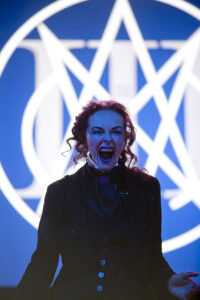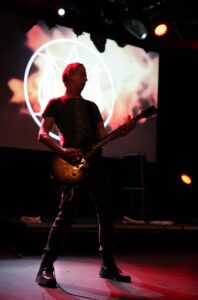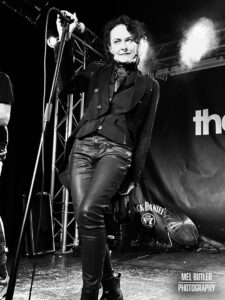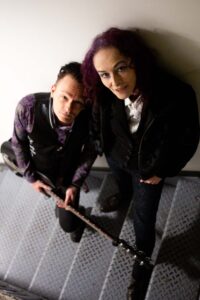Cover Photo: Alienation.
In 1981, the city of Leeds saw the birth of The March Violets, a four-piece with a drum machine (Dr. Rhythm) whose first EP, the legendary Religious as Hell was produced by Andrew Eldritch. During the early eighties they recorded a series of singles that, today, are considered post-punk classics. The band had a first era that came to an end in 1987, but this new millennium saw The Violets come back together and even record new songs. They are now working on a new album to be released later this year. They are one of the bands you can’t miss at DarkMad, festival that will be held between the 10th and the 11 of May in Madrid.

Photo: Simon Topp
—Before the interview, I read the booklet of your The Palace of Infinite Darkness, and one thing that was missing in such a complete text was how did the four of you meet. Was it at the University?
–Rosie: Leeds, 1981. I met Tom Ashton, Simon Denbigh, and Lawrence Elliot. We drank at the same pub (The Faversham), went to the same gigs. And yes – we were all students. Simon & I were studying English at the University & Tom was at Jacob Kramer Art College…
–Tom: I met Loz, our original bass player up in Scotland in the early 70s. We were schoolfriends and went on to form our first band, Spiked Copy. When Loz moved to Leeds to attend University, I moved down the following year. The rest is history!
—Rosie, you had confessed to have some curious tastes like Hawkwind and Frank Zappa. Do you think that they have influenced you musically too? What do you find interesting in their music? I am also a fan of the music of Zappa and Dave Brock’s band, that’s why I ask.
–Rosie: As well as the mind-expanding psychedelia, I loved the way they broke away from musical conventions such as the formula of verse-chorus-verse. They took chances creatively, lyrically, musically. It fired me with enthusiasm to make my own leaps into the unknown. I didn’t always know what I’d find – but I knew I’d find something.
—All of you have spoken repeatedly about the “Goth scene”. For me the scenes put limits to something that has not. I guess that you believe that same as the band said that back in the day was a little demarcation. How was the scene in which The March Violets appeared?
–Rosie: Goth is the “scene that wouldn’t die”! When The March Violets first formed, the scene didn’t have a name. It was a lively mix of punk, glam, romance, death and darkness. It gave us space to be different, without limits. There were “indie” nights in the clubs, where Goths, punks, rockers, hippies, metalheads and new romantics all danced to the same tracks and got stuck to the same sticky carpet. Oscar Wilde said “To define is to limit”. The March Violets have never felt constricted by labels. We have never been “Goth By Numbers”, rehashing tired Goth tropes… and never will be.
–Tom: I came very much out of Punk. My Mum bought me Never mind the Bollocks for Christmas in 1977 and I still think that album sowed the seed of my guitar playing, so not very Goth really!
What I do remember about that early period of The Violets was a sea of music journo’s trying to label what was happening and every band not giving a damn about trying to fit in. The Violets were, I think, our reaction to all the synthy pap that was filling the top 40. We wanted to dance but we were also still punk rockers at heart. And we couldn’t be bothered to audition drummers, so we did what we did!
—The band has never fear to show their politics ideas. How do you see the situation nowadays after Brexit?

Photo: Alienation
–Rosie: The March Violets formed in 1981, a time of political upheaval, mass unemployment and police corruption. We were part of those times, so of course we were affected. In 2024, times are dark once again. Plus ça change. For the UK, Brexit is a disaster for everyone (except the ultra-rich, and they’re not reading this article or attending DarkMad, right?). I loathe division. Everyone loses out. We are all in this together.
–Tom: “Crow Baby” just got used in a BBC2 doc about the miner’s strike in 1984. It felt very right that being in there because although not overtly political musically, we do feel very strongly about the utter bullshit that some sections of humanity will force onto others if they think they can get away with it. It’s interesting that the resurgence of dark music we’re seeing is coinciding with the idiocy happening in some quarters of Europe and the USA.
—Rosie, you said that BBC DJ John Peel help the band get to more people. The band recorded some BBC sessions with him, how was the experience? How was John Peel in person?
–Tom: John Peel and others at the BBC were incredibly helpful to us and others, we were offered our first Peel session before we even released our first EP! In all we recorded 3 Peel sessions, 1 for Kid Jensen, 1 for Janis Long and a Saturday live for Richard Skinner. It was awe inspiring going into Maida Vale studios as teenagers and getting to work in that space and with those producers and engineers. Also, because the cafeteria was government subsidised it only cost 1p for a cup of tea and bacon, egg, beans and chips were 10p!
We didn’t get to meet Peel as he was never at the recording sessions himself, but decades later in 1999 I was working on his Meltdown festival at the South Bank Centre in London and got to meet him and his family and thank him personally, it felt good!

Photo: Alienation
–In an interview the band talked about the funk influence in your music, which was also present in bands like Gang of Four, A Certain Ratio and The Pop Group. Even Bauhaus had also a disco/funk influence. Why do you think it disappeared from Goth music?
–Tom: I was into the “art funk” scene a fair bit and Loz was heavily into JJB from The Stranglers who had some funky grind for sure. I think we didn’t want to be a straight rock band so funky bass lines and clipped guitars in places helped to avoid that. A lot of the dance element in Goth seems to have moved into that EBM’y, programmed thing which has its great moments but has become a bit hackneyed over time.
–One thing I would like to know better, if Cleo Murray started as a second singer or if she was already coming to the band to substitute Rosie?
–Rosie: I left The March Violets after “Snake Dance”. Cleo was the new singer & carried the torch!
–Tom: Cleo was Daniel Glee’s partner from the band Living in Texas who we worked with and when Rosie left, Cleo was the obvious replacement as we already knew and liked her. There wasn’t a time when both were in the Violets though.
–Back in the day, did you ever think of recording a full album?
–Tom: I think we were just moving too quickly to settle down and do the work in one sitting! We just kept banging out singles/EPs. It was a shame as a lot of songs we were playing live never got recorded properly. Some of the demos are there on the Palace of Infinite Darkness cd boxset though.
–In 1986, the band released “Turn to the Sky”, the most pop track recorded by the March Violets till thenl. The song featured in the soundtrack of Some Kind of Wonderful, a movie written by John Hughes and the line-up included a drummer!! How do you remember, Tom, that period of the band?
–Tom: It was a great time, with some Rock’n’roll madness thrown in! And The Violets always had and still have, a pop sensibility even on the dark and twisted stuff so it felt like a natural progression at the time. We toured a lot in UK/Europe and the USA, and I met and made a lot of friends in the process. That movie is getting a bit of a renaissance as the story seems to find a lot of relevance with the youngsters growing up this century too.
—Rosie, during that time you became an English teacher in Sudan. How was the experience?

Photo: Chris Bub
–Rosie: In 1984, the political situation in the UK was appalling. I was coming out and drifting creatively. I needed a complete shake-up. When I left The March Violets, I also left Leeds and England. I made the dramatic move to Sudan and worked as a teacher for two years in a secondary school in Darfur, close to the Libyan border.
I was in my mid-twenties, had never travelled outside Europe & to say I was naïve in the understatement of the decade. My 2 years in Sudan were definitely a learning experience. Not least, shortly after I arrived, the “famine” hit the headlines, along with Live Aid. I learned the harsh lesson about who suffers in a famine, (i.e. not the wealthy). How the money from vast charity efforts like Live Aid (even with the best will in the world) does not trickle down to those who need it.
For many reasons, it was one of the most memorable times of my life. It’s an over-simplification, but the people I met were without doubt the most generous people I’ve ever met. I still feel humbled by their kindness.
–In 2015, the band made a new album, entitled Made Glorious. How was working together again?
–Rosie: In 2015 Simon & I were in the UK, Tom was in the USA. New technology meant we could work long-distance. Despite the opportunities offered and the great songs we wrote, there is nothing to beat working in the same physical environment. Magic happens, an alchemy that is impossible to experience in any other way. See below!
–Tom: It was a long labour of love taking 3 years from inception and a bit disjointed in its process. There’s some great stuff on there but quite a bit of it is Simon’s vision of the band which is fine as he was overseeing it. I can’t say I feel a huge connection to it though and we only play 2 tracks from that album live.

Photo: Simon Topp
—Although Pledge went bankrupt, what do you think of this way of financing your records? How was the experience?
–Rosie: In 2015 Pledge collapsed. Despite Tom, William and I fulfilling ALL of our personal pledges, a lot of loyal fans were still affected. Suffice to say, The March Violets will not crowdfund future albums.
–Tom: That was no fun at all for anyone in the band or in our fanbase. The less said the better really.
—What happened with the release of Mortality? You could not finish it because of Si’s sickness, right? At the end you only released a digital version. Would you like to do a full released of this material?
–Tom: The covers of our own classic tracks that we rerecorded for Mortality will not see the light of day on physical media, however the eponymous title track did get a release in demo form on the Play Loud Play Purple comp on Jungle Records. We have also recorded it for the upcoming new album.
—The new album that it’s supposed to be released this year is called Crocodile Promises. What can you advance us of it? One of the tracks “Virgin Sheep” from 1982 was found when you were gathering material for the box set, right?
–Rosie: In 2023, we spent a magical January in Tom’s studio in Athens, Georgia. As mentioned above, there is nothing to compare with the experience of creating in the same space. Free from distractions – Tom’s studio is deep in secluded woodland –we wrote 9 new tracks.
As for “Virgin Sheep” – yes, I found an original demo tape from 1982, including ‘lost’ tracks “Virgin Sheep” and “The Palace of Infinite Darkness”!
–Tom: The album is called Crocodile Promises and we are looking at a summer release this year. We’d forgotten we’d even written “Virgin Sheep” which is a bit scary! Who knows, we might do a version of “The Palace of Infinite Darkness” for the next album.
Crocodile Promises is a triumphant continuation of what The Violets should be, without the wobbles of the past. We have a feeling people are going to be blown away by it as there is nothing else like it out there!
—Tom, you have been producing a few bands at your studio in Athens. Any late work or band you have been involved with that you would like to recommend?
–Tom: Yes, I’ve been working with Vision Video a lot, producing their first 2 albums and playing live bass for them up until the end of last year. I also recorded large chunks of Pylon Re-enactment Society’s album, Magnet Factory which just got released on Strolling Bones Records. They’re fantastic! And I’m off to the record release party for Tears for the Dying new album, In the Shadow of the Midnight Sun soon. Another fantastic Athens band that I recorded/mixed.
—You have also been doing soundtracks for movies like Accidental Exorcist. Can you please tell us more about this other side of you? You have always been interested in Horror movies, right?
–Tom: Oh yes, I LOVE horror movies! I collected every issue of Fangoria magazine in its ‘80’s heyday. I collected horror movie soundtracks as a teen and always wanted to contribute music to my favourite genre. Between 2012 and 2016, I must have scored about 12 low budget horrors! The studio and band stuff took over after 2017 but it’s something I will definitely go back to if I get the chance.
—Tom once you said that you might release some material from Amania, the band you created with Craig Adams and Steve Hewitt. What happened? What do you remember of this band?
–Tom: Yes Cleo, Craig and I did write and demo an album’s worth of material and my friend Steve Hewitt helped us on drums along with a bunch of other mates. Who knows, maybe it will come out sometime, I’ll ask Craig next time I see him!

Photo: Mel Butler
—For the previous DarkMad we interviewed Joolz who has been writing novels for a long time and now we have you, Rosie who has also written some fiction. Your first novel, the Palace of Curiosities is about a person with hypertrichosis. When I was a child, the daughter of one of our neighbours had a similar problem but I really can’t tell how serious it was because when this condition started, she stopped going out. How did you get the idea for this novel?
–Rosie: I was inspired by the lives and struggles of people with spectacular bodies. In particular, Julia Pastrana (1834-60), a Mexican woman born with hypertrichosis and who was exploited as a circus exhibit. I decided to create the character of Eve – she faces real challenges but is not tragic. Despite everything the world throws at her, she finds her own voice and takes charge of her life.
—And now you are going to release a new novel, right? What can you please tell us of it?
–Rosie: My new novel is “The Fates”. It’s a re-telling of the Greek myth of the Fates, the 3 sisters who weave the thread of destiny. In my story, the Sisters want to give free will to mortals, placing destiny into human hands. But the Gods are plotting against them. The Sisters need mortal help – and find it in the woman-warrior Atalanta and the hero Meleager. The novel also contains monsters, magical adventures and badly behaved Gods…
—You have also published a few collections of poetry. How would you describe your poems to the public who only know you for your work with The March Violets? Do you think that your literature work can also appeal to your music fans?
–Rosie: Our fans are amazing. My latest poetry collection is “What Girls Do in the Dark”, and they love it! Feedback has been so positive. Also – there are times where I use my poems as inspiration for lyrics. To choose one example, “Dress 4 U” (on the Made Glorious album) is based on a poem from my collection “Things I Did While I was Dead”.
—As Rosie Lugosi, you Rosie use comedy to subvert notions of normative sexuality and gender. Do you think that your cabaret persona has developed from your work at the March Violets, or do you see it as complementary?
–Rosie: It’s complementary. In fact, all my creative work (lyrics, novels, poetry) is linked by my desire to connect with others. My passion to perform springs from the determination to break down barriers and find my voice. As a child, this flew in the face of Biblical directives that females submit and serve. I was labelled a show-off. Parental put-downs included little madam or too big for your boots. When I persevered, I was called stubborn rather than determined. I kept going!
—It’s a shame that William Faith is no longer touring with you. How were these years that he was part of the band?
–Rosie: William is a great bassist, and toured with us in 2014-2015, and in 2023. He’s a creative guy, so naturally he has his own band, which takes up all of his time. We were lucky to have his talents in 2023.
–Tom: It was wonderful working with William, he is such a talented musician and player! But being in The Violets has turned into pretty much a full-time job this year so his commitment to The Bellwether Syndicate must take precedence.

Photo: Kristy 18
—And Mat Thorpe is the “new” member. What do you think that he adds to the sound of The March Violets?
–Rosie: Mat was our bassist for the 2007 Homecoming reunion, and he’s been a behind-the-scenes member of Team Violet since then! He’s stepping centre stage and bringing his unique bass sound and vocal talents to the mix. Plus – he’s the nicest guy you could ever hope to meet.
–Tom: I’m so chuffed to have Mat back in the fold. A talented and lovely bloke who is pitching in all the help he can. Just what we need! He will be helping us write the next record too.
—How is Simon Denbigh doing? He left touring after his stroke, right? Is he still a studio member of the band?
–Rosie: Sadly, Si is unable to work with us now. We continue to honour his past contribution.
–Tom: Yes, sadly Simon’s circumstances don’t allow for any contribution to The Violets going forwards, but he lives on in the material and it felt great to finally give Made Glorious the vinyl release it was designed for and deserved last year.
—What can we expect of your concert at DarkMad? Some new songs?
–Rosie: Yes! As well as fan favourites like “Snake Dance” and “Walk into the Sun” we’ll be playing songs from the new album… and unveiling our brand new single, “Hammer the Last Nail”. You can expect the excitement and energy of The March Violets on stage! Life is short, do it now, and have an amazing time while you’re at it.
–Tom: Well, the last time The Violets played Madrid was in 1986 so I’m stoked to be back there again this year! We’ll be banging out the classics of course but also 3 new tracks from the upcoming new album. See you there!



